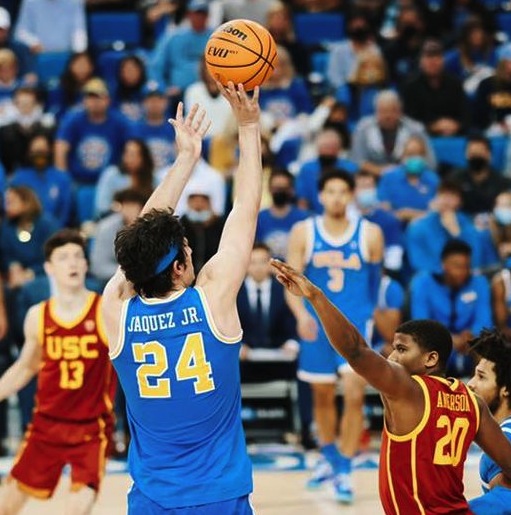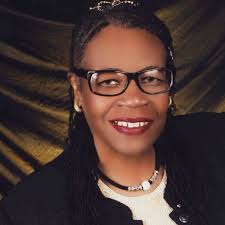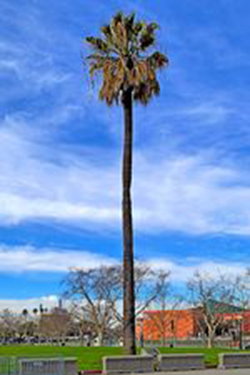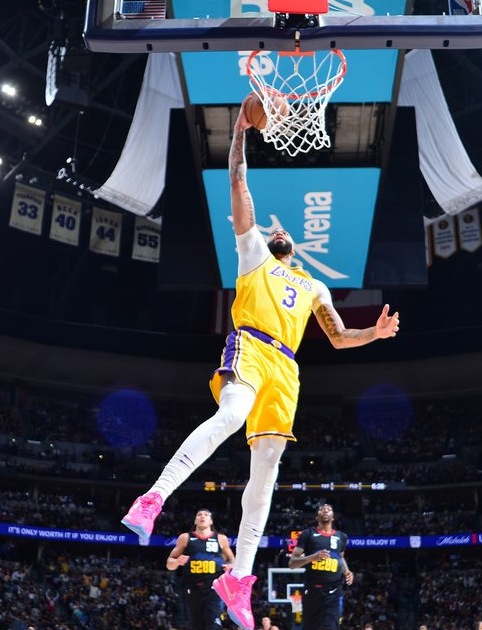By Don Wanlass
Contributing Writer
Arizona may be the favorite to win the Pac 12 men’s basketball tournament, but USC and UCLA get the prime-time television slots March 10 during the second day of the tournament.
The top four seeds in the tournament skipped the opening round March 9. UCLA, the No. 2 seed in the tournament, will play the winner of the Washington State-California game at 6 p.m. in a game that will be televised by the Pac 12 Network.
USC, which fell to third in the conference standings with its loss to UCLA March 5, will face the winner of the Washington-Utah game at 8:30 p.m. on Fox Sports 1.
Despite being the top seed in the tournament and the No. 2 team in the nation, Arizona plays at noon against the winner of the Arizona State-Stanford game.
With wins March 10, USC and UCLA will square off for the third time this season in the tournament semifinals March 11 in a game to be televised at 8:30 p.m. on Fox Sports 1. The tournament championship game will be played at 6 p.m. March 12 on Fox.
The tournament is again being held in the T-Mobile Arena in Las Vegas.
The Pac 12 shocked most of the college basketball world last season by placing three teams in the Elite 8 of the NCAA Tournament. UCLA, USC and Oregon State all made it through three rounds of the tournament. Only UCLA advanced to the Final 4, where it took a buzzer-beater by Jalen Suggs of Gonzaga to eliminate the Bruins.
The Bruins and Trojans are both in position to make another deep run in March Madness this year.
Both teams have size, depth and athleticism. In Mick Cronin and Andy Enfield, the Bruins and Trojans also have coaches that stress defense and both are capable of making the right moves in tight tournament games.
But it is March Madness and anything can happen.
To be successful, the Trojans need to find a consistent scorer besides Isaiah Mobley.
Mobley was a first-team all Pac 12 selection this week after averaging 14.6 points and 8.5 rebounds a game to lead the Trojans in both categories.
Guards Drew Peterson and Boogie Ellis and forward Chevez Goodwin also averaged more than 10 points a game, but all three have trouble putting consecutive high-scoring games together.
In his last four games, Goodwin has averaged less than seven points a game and Ellis is only slightly better.
Peterson, a transfer from Rice, has been the second most consistent for the Trojans all season and, at 6-9, might be their most versatile player. He is capable of running the Trojans’ offense when Ellis is out of the game and is size allows him to help out on the boards.
A first-team all Pac 12 selection with Mobley, Peterson also can get hot from three-point range, something that is essential for the Trojans the rest of the way.
The Bruins had three players selected to the all Pac 12 team this season: point guard Tyger Campbell and wing players Johnny Juzang and Jaime Jaquez Jr. It is the second time Campbell has been selected first team all-conference.
Those three players are the key to the Bruins’ chances for making another run to the Final 4.
Jaquez has been bothered by bad ankles all year and is just starting to hit his stride. He scored 27 points Feb. 28 in a win over Washington and followed that with a 30-point effort against USC as the Bruins snapped a five-game losing streak against the Trojans March 5.
Juzang returned to action against the Trojans after missing games with his own ankle injury. He has led the team in scoring all year, averaging 16.7 points a game, followed by Jaquez at 13.3.
Campbell runs the Bruins’ offense and averages 11.7 points a game.
Senior guard Jules Bernard averages 12.3 points a game and can score from outside and in close. The Bruins have two good post players in Cody Riley and Myles Johnson.
Riley is the better scorer of the two, but Johnson can be a force on the boards and at the defensive end with his shot-blocking ability.
The Bruins also have solid depth with senior David Singleton, sophomore Jaylen Clark and freshman Peyton Watson coming off the bench. Jake Kyman can also do some damage, especially beyond the three-point arch.
Neither the Bruins nor the Trojans figure to draw top seeds in the tournament when the NCAA Tournament brackets are announced March 13. Most prognosticators have the Bruins penciled in as a fourth seed with USC a fifth or sixth seed, but just getting into the tournament is an accomplishment.
UCLA had to play in a play-in game last year, edged Michigan State in overtime to make the final 64-team tournament and then advanced all the way to the Final Four.
Getting in is crucial. Getting a good draw, catching a few breaks and playing well is what it takes to advance.
MISSING BASEBALL: Friends of mine normally would be spending this weekend in Arizona watching spring training baseball. It is a ritual undertaken ever since the Dodgers shifted their spring training base from Vero Beach, Florida, to Glendale, Arizona, in 2009.
Not this year. There’s nothing to see. The lockout of the players by the Major League owners has dragged into its fourth month and the first week of the regular season has been canceled with possibly more cancellations coming this week.
It may be hard to side with major league players who make on the average about $4 million a year to play the game many of us would play for free, but it is harder to side with the owners in this dispute.
The owners want a salary cap, something owners in professional football, basketball and ice hockey already have. The Major League Baseball Players Association has always opposed a salary cap.
The players did allow the owners to place a luxury tax on teams once salaries reached a certain level and the owners have reacted by using the luxury tax as a cap. Teams will pay right up to the luxury tax, but only a few each year — the Dodgers being one of them — go over that cap.
The players want the luxury cap to increase each year as revenues go up, the owners want to keep the luxury tax as low as possible, reducing spending.
The players want the owners to police themselves when it comes to teams failing to field competitive teams year after year. Small-market teams like Pittsburgh, Tampa, Oakland and others throughout baseball are subsidized by larger-market teams with substantially more local television revenue, but there is nothing requiring those small-market teams to invest that revenue-sharing money in players’ salaries.
The players want that to change.
Baseball has never made up the ground it lost when the players went on strike in 1994, cancelling most of the last two months of that season along with the World Series.
Pro and college football and, particularly NBA basketball, filled the void, and baseball — once the national pastime — became the third most popular sport in the country.
An extended lockout could cause another fall in popularity. People already learned during the pandemic that there are other things to do besides watching sports.
Commissioner Rob Manfred doesn’t help matters with his stupid statements. Last year, he referred to the World Series Championship Trophy as “only a piece of metal.” He continues to say that games are too long. As the commissioner, he should be doing everything possible to promote the sport, but instead he does the opposite.
The sport has done a horrible job of promoting its star players since the 1994 labor dispute, when the owners decided that promoting players only made them want more money.
The labor dispute needs to be resolved and the season needs to get underway as soon as possible.
And the owners need to do more of the compromising.












